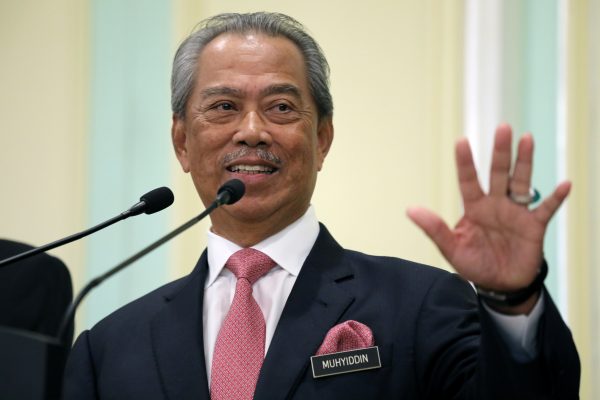The most visible surprise is that there is no deputy prime minister. While not mandated by Malaysia’s constitution, naming a second-highest officeholder was established by Malaysia’s first prime minister, Tunku Abdul Rahman. Instead, the cabinet has four senior ministerial positions for Education, Works, Defence, and International Trade and Industry.
The Prime Minister also does not simultaneously occupy the Finance portfolio — a practice established by former prime minister Mahathir Mohamad in the aftermath of the Asian Financial Crisis and continued under the Abdullah Badawi and Najib Razak administrations. At RM68 billion (US$15.7 billion), the Ministry of Finance’s 2020 budget accounts for almost one-quarter of the national budget of RM297 billion (US$68.6 billion).
Muhyiddin instead appointed former Group CEO of CIMB Group Holdings Tengku Zafrul Aziz to the portfolio. Still, the Prime Minister’s influence on this ministry will not be weakened as Zafrul is not a member of a political party and will likely not have the organisational wherewithal to be overly independent.
The Prime Minister’s Department (PMD) has also been significantly strengthened and will command a budget of at least RM11.1 billion (US$2.56 billion) — the sixth largest overall. The PMD retains the Religious Affairs portfolio and the Law and Parliamentary Affairs Ministry. It also incorporates the Economic Affairs portfolio, headed by Mustapa Mohamed, a senior policymaker and member of Muhyiddin’s Malaysian United Indigenous Party (Bersatu). The PMD also contains the newly-created Ministry for Sabah and Sarawak Affairs and the vague-sounding Special Duties portfolio.
Muhyiddin’s party has done better than any of its coalition partners. Bersatu was allocated two senior ministerships — Education under party strategist Radzi Jidin and International Trade and Industry under Azmin Ali. The party also secured eight more portfolios including Home Affairs, Rural Development, Agriculture and Food and Housing and Local Government. These ministries are highly-visible and implement projects in Malaysia’s constituency-rich rural heartland.
In contrast, the United Malays National Organisation (UMNO) fared poorly. Despite having 39 MPs to Bersatu’s 30, it obtained only three high-profile portfolios. The Defence portfolio went to UMNO Vice President, Ismail Sabri Yakoob. The party also obtained the Health and newly-established Higher Education portfolios. The remainder are relatively small in organisational and budgetary terms. In a nod to the corruption allegations against UMNO leaders, party president Zahid Hamidi and former prime minister Najib Razak were absent from the line-up.
Gabungan Parti Sarawak did well, netting four ministerial portfolios including the Senior Ministership for Works. Despite also having 18 MPs, the Pan-Malaysian Islamic Party (PAS) did not have any senior ministerial appointments and gained only three portfolios. PAS was denied the coveted Religious Affairs Ministry (although a party member was named Deputy Minister), and was unexpectedly allocated the Environment portfolio.
In the coming months, Muhyiddin’s cabinet and parliamentary majority will be put to the test by internal and external threats.
Within the Perikatan Nasional coalition, Muhyiddin will face pressure from UMNO for more consequential cabinet positions — senior leaders are already calling for a more equitable sharing of portfolios. But Muhyiddin is constrained by the need to control key ministries and avoid being seen to placate a party that was rejected by voters in 2018. But should UMNO leaders rebel, the Perikatan Nasional grouping could crumble.
There is a possibility that Muhyiddin will face a vote of no confidence in parliament put forward by the ousted Pakatan Harapan coalition when it convenes in May. Muhyiddin may also be challenged for the Bersatu presidency in June by Mukhriz Mathathir — Mahathir’s son. This scenario is a feasible mechanism for Mahathir to dislodge Muhyiddin, instead of trying to entice a large number of parliamentarians to cross the floor.
The Malaysian economy is also facing serious headwinds including turbulence from the US–China trade war, COVID-19 and the falling demand from China as a result, and reduced tourist arrivals in the wake of border shutdowns. According to Malaysia’s central bank, the country’s economy grew 4.3 per cent in 2019, but estimates the overall growth rate for 2020 to be between -2 and 0.5 per cent.
Cost-of-living issues consistently figure as the number one issue worrying Malaysia’s voters and played a significant role in the 2018 elections.
The lockdown to slow the spread of COVID-19 will hit Malaysians hard. All public gatherings — including religious, sporting, social and cultural events — have been cancelled or postponed. Schools, universities and businesses — except food supply, banking, healthcare, transport and security services — are to remain closed. The lockdown has now been extended to 28 April and could be prolonged beyond that. The country’s welfare system consists of sporadic and variable pay-outs to specific interest groups and is not geared to more permanent transfers. Affected by Najib Razak’s excesses — as well as Pakatan Harapan’s repeal of the Goods and Services Tax — Muhyiddin’s fiscal room for manoeuvre going forward is limited.
Well-known as a sober technocrat and a backroom negotiator, Muhyiddin’s skills will be put to the test in the weeks and months ahead.
Francis E Hutchinson is Senior Fellow and Coordinator of the Malaysia Studies Programme at the ISEAS-Yusof Ishak Institute in Singapore.

